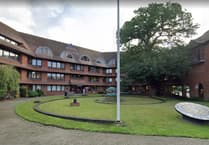The Pirbright Institute has turned food scraps into fertiliser gold with a new low-tech composter that’s helping cut emissions and feed its allotments.
Installed earlier this year, the hot composter uses natural aerobic processes to break down food scraps from the staff canteen, mixing them with wood pellets to produce up to 6.5 tonnes of mulch annually. For every 5kg of waste added, the Institute generates around 4kg of nutrient-rich compost.
“It’s an ideal solution to the problem,” said Julie Maryan, Safety and Environment Officer at the Institute. “We faced a dilemma. We could hire an additional contractor to collect food waste, but it would cost money and mean more vehicles coming on site, creating more emissions.
“The alternative was to buy a hot composter to manage our own food waste. It’s proving to be a great success. It means we save money on waste collections, remain compliant with the regulations, and can use the mulch to improve the quality of our site soil and provide compost for our recently re-established allotments. We also cut down on transport emissions and reduce landfill.”
The initiative follows new legislation introduced in March requiring all businesses to separate food waste from general waste. With backing from Chef Manager Jennifer Edwards and her team, the composter now processes around 80kg of food waste each week, reducing landfill and providing a steady supply of compost.
“If the Institute continues to combine our kitchen waste with wood pellets, we can expect to generate around 130kg of compost a week,” said Ms Edwards. “It’s a win-win for everyone involved.”
The compost is already being put to good use on the Institute’s site, both to improve soil quality and fertilise a set of newly re-established allotments.
Made by North Devon firm Ridan, the composter has a 20-year lifespan and is used by a variety of organisations including the National Trust and ITV Studios.





Comments
This article has no comments yet. Be the first to leave a comment.